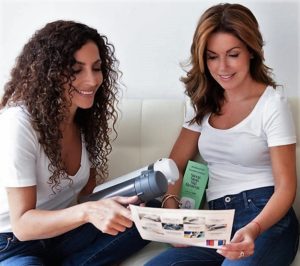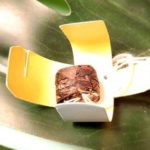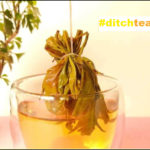
Inspiring Innovation

Orit Eisenberg is irrefutable proof that it sometimes takes 25 years to become an overnight success. During the recent World Tea Virtual Summit, Eisenberg, a product development specialist and production designer, told her founding story with humor and extraordinary passion. She launched the Mennä ONE in September 2019 after testing 20 prototypes over five years, gradually refining the elusive challenge of controlling steep time on the go. Tea travelers are trendy and in widespread use, but they break, leak, and have too many moving parts. They are also hard to clean. Some are too hot to touch. Invariably the tea within turns tepid, or watery, or bitterly over-steeped.
“We are avid tea enthusiasts, and we’re thrilled to bring this much-needed product to tea drinkers around the world,” she said during a virtual presentation from the company’s Canadian offices. “Tea lovers know that every blend should be treated differently, and the bitter taste that comes from over-steeping should only come through personal choice!”
Holiday Tea Gifts
See the collection
Or skip to the category of your choice:
Holiday Teas
Holiday Teaware
Holiday Tea To Go
Stocking Stuffers
Tea Gifts for Children
Tea Books for Children
Holiday Tea Gift Sets
Holiday Tea Accessories
Holiday Teapots
Tea Books for Gifting
Kettles
Electric Kettles
Brewers
Electric Brewers
What sets Mennä ONE apart from the typical tea traveler is a patented external ring that controls the infusion from outside the vessel.
“Our product is all about giving drinkers complete control over the infusion to create a perfect tea for them, every time,” says Eisenberg.
Eisenberg said distribution has grown in the past year. She credited COO Natalie Ben-Zur, “an expert in e-commerce and navigating the marketplace worldwide,” with helping her to grow the brand and prepare for what’s next – a borosilicate teapot featuring the patented control-ring infuser basket.
The Mennä ONE appears on the cover of this year’s Holiday Gifting issue as a reminder that as the tea industry advances, overcoming obstacles will require persistence and a willingness to take risks. Those talented entrepreneurs, like Eisenberg, who persist with passion, inspire all.
Teadips (just leaves, please)
 It took Orit years and a sizeable investment to develop and test prototypes until she was confident Mennä ONE could go into production.
It took Orit years and a sizeable investment to develop and test prototypes until she was confident Mennä ONE could go into production.
Halfway around the world in Assam, India, two childhood friends who invented Woolah Teadip demonstrated similar determination and resourcefulness. Upamanyu Borkakoty and Anshuman Bharali created their latest innovation with little more than scraps of cardboard and a ball of string. Growing up, they knew that locals brewed tea by tossing a handful of dry processed leaves into a glass. Some toss whole leaves into a boiling kettle on the fire. Once the leaves are spent, they get tossed into the fire or discarded in the waste pile.
The result is always messy.
The two young men were also concerned with waste generated from packaging and, worse, teabags that generate micro-plastics invisible to the eye.


“We wanted to build a happy, fun, quirky and contemporary brand in the world of organic teas, and the first step was to ditch the conventional and potentially harmful tea bags,” says Borkakoty. He explains that the new processing and packaging technique “lets consumers see what they sip, the finest quality of two leaves and a bud (unopened leaf at the tip of a branch) in their pristine state.”
Unlike the delicate small leaf (C.Sinensis), Assam’s tea is a large-leaf varietal (C. Assamica). Simply bundling and tying following processing keeps the leaves intact. It also makes every bundle unique. There is no “dust,” leaf breakage is minimal. The tea in the cup is made from leaves plucked from the same or a closely related tea tree cluster.

Getting the tea into a compact, environmentally friendly packaging was more formidable. The wrap is biodegradable as well as external boxes and single wrappers. The string cinching the bundle is raw virgin cotton, free from processing residues and bleach. Production is small scale and sustainable. The tea sells for INRs450 for a pack of 16 Teadips ($6 or 37-cents per cup). A box of 28 Teadips sells for INRs680 ($9 or 32-cents per cup). Shipping is free in India with a minimum order.
Tea Journey has followed the work of these young industry leaders for several years. In 2015 Bharali and Borkakoty established The Tea Leaf Theory (TTLT), a venture solely to inspire tea innovation. “The team is very lean, choosing to remain independent, bootstrapped, refusing certifications, they represent a new kind of startup, modern yet rooted in something traditional, ancient even. There’s the social impact, but Tea Leaf Theory is not an NGO working for small farmers, writes Contributing Editor Aravinda Anantharaman.
“We want to make them entrepreneurs, not beneficiaries,” say co-founders Borkakoty and Bharali.
Woolah is an example of their success.

Tea Market
Get More Value from Your Tea: BRU Maker One
+41794574278
Jacque's Organics
(647) 804-7263